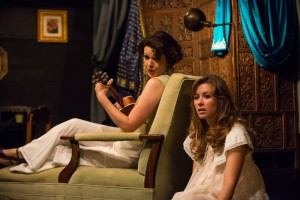
 Highly Recommended ****For the first time ever, Thomas Middleton’s Jacobean tragedy “Women Beware of Women” is appearing on the Chicago stage. No doubt, the main reason for the plays neglect is Middleton’s contemporary William Shakespeare’s work is always the first choice when a theatre company decides to do an early modern play. However, a cursory glance at the story may have deterred directors and companies as well: the plot is complex and graphic, and its values, particularly in regard to gender, are largely those of the Jacobeans, but its focus on gender issues has given one or two brave directors, like Kathryn Walsh, the courage to try.
Highly Recommended ****For the first time ever, Thomas Middleton’s Jacobean tragedy “Women Beware of Women” is appearing on the Chicago stage. No doubt, the main reason for the plays neglect is Middleton’s contemporary William Shakespeare’s work is always the first choice when a theatre company decides to do an early modern play. However, a cursory glance at the story may have deterred directors and companies as well: the plot is complex and graphic, and its values, particularly in regard to gender, are largely those of the Jacobeans, but its focus on gender issues has given one or two brave directors, like Kathryn Walsh, the courage to try.
Leantio (Josh Zagoren) returns to his mother’s (Morgan Mcabe) home with his new bride, Bianca (Eliza Hoffman) who has gladly given up a luxurious life to marry him. Meanwhile, a young woman named Isabella has been told by her father that she must marry a young ward who is a “natural fool,” but discovers that her uncle, Hippolito (Michael Mercier), is in love her. Isabella’s Aunt Livia, the archetypical sexually experienced widow that the early moderns so feared, helps facilitate both illicit relationships. In the end, the women promote their sexuality and the men give into theirs, losing power over both their own passions and the women they love and control. This leads the women to their deaths and the men to their damnation.
But the play’s meditation on power is not as conservative at it sounds. In particular, the dialogue contains many profound and enduring thoughts on the nature of love, gender, and control, and Katharine Walsh successfully brings out the proto-feminist and egalitarian aspects of the play, focusing particularly on the violence against women and women’s lack of choices in society (Although it should be noted in regard to Isabella’s dilemma that though arranged marriages were common in Jacobean England, forced marriages were not, and young people, almost without exception, had veto power over any potential-mate). Above all, Walsh knows how to cast and direct the actors who flawlessly deliver the Jacobean dialogue with emotion and meaning while maintaining the rhythm of iambic pentameter. The result is classical acting at its very finest. In the very first scene, in which Josh Zagoren (Leantio) Morgan Mcabe (Mother), and Eliza Hoffman (Bianca) interact, it becomes clear that these are very talented individuals who can read early modern blank verse with passion while maintaining its rhythm and making it sound natural. Fortunately, the rest of the cast delivers on the promising opening. In particular, Loretta Rezos was stately, beautiful, and menacing as Livia, never losing her energy or presence during what was a very long performance. Even more incredibly, not a single actor stumbled or hesitated over one of his or her lines.
In the very first scene, in which Josh Zagoren (Leantio) Morgan Mcabe (Mother), and Eliza Hoffman (Bianca) interact, it becomes clear that these are very talented individuals who can read early modern blank verse with passion while maintaining its rhythm and making it sound natural. Fortunately, the rest of the cast delivers on the promising opening. In particular, Loretta Rezos was stately, beautiful, and menacing as Livia, never losing her energy or presence during what was a very long performance. Even more incredibly, not a single actor stumbled or hesitated over one of his or her lines.
The only problem was the bizarre decision to cast some female actresses as male characters. This included Isabella’s father (Morgan Mcabe) and the cardinal who were supposed to represent men’s power over women and God’s power of men respectively. It served no apparent purpose, and significantly devalued the scene in which the cardinal, played by Laura Lapidus, eviscerated his brother The Duke (Michael Mercier) with the threat of the judgment of God from whom the Jacobeans believed all authority came. That said, one is tempted to forgive this choice given the skill with which Lapidus delivers her lines. It is a small part, but she truly makes it one of the high points of the play, conveying sincerity, urgency, frustration, horror, and concern while keeping perfect meter Nonetheless, it is impossible to forget that is a female actress reading the lines, and despite the actresses talent, lost its meaning as a foil to the final scene and the women’s destruction.
The most obvious technical choice was to put this play in room rather than on a stage, and have the actors move among the audience who are seated on sofas or at tables. It certainly intensified the performances, but at the expense of the ability to do anything sophisticated with scenery (Sarah Watkins) and lighting (Sarah Hughey), and because the air conditioning either went or was turned off, the room became very, very hot under the stage lights. Nonetheless, the acting, and Walsh skill at relating to the play to contemporary women’s issues made it worth it.
The Two Pence Theatre Company is producing the play at The Den Theatre which is located at 1333 N. Milwaukee Avenue. The production runs through September 27th with performances on Thursday, Friday, and Saturday at 7:30 pm and Sunday at 3:00 pm. Tickets are 25 dollars and can be purchased at www.twopencetheatre.org/see or by calling 773-398-7028.The play includes one intermission. To see what others are saying, visit www.theatreinchicago.com, go to Review Round-up and click at “Women Beware of Women”
Parking is a bit of a problem on Milwaukee Avenue, and I find public transportation to be the easiest of ways to get to the intimate Den Theatre.






More Stories
“Adverses”
“Blue” reviewed by Jacob Davis
“The Secret Garden”